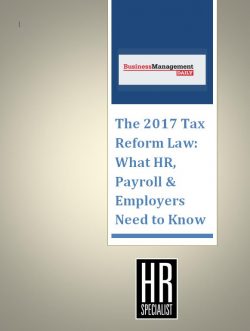In December 2017, Congress passed the first major overhaul of the U.S. tax code in more than 30 years. The law, colloquially known as the Tax Cuts and Jobs Act, will have a far-reaching impact on both employers and employees. Specifically, employers confront an altered landscape when it comes to certain fringe benefits and pay policies. And, you will have to adjust your payroll system very quickly to accommodate these changes, as no transition relief has been provided.
This 15-page report, authored by Alice Gilman, editor of Payroll Legal Alert, offers a detailed breakdown on the new tax law’s impact on U.S. employers, and more specifically Payroll and HR departments. To download it, click on the image or link below.
http://www.nibmimages.com.s3.amazonaws.com/2017%20tax%20reform%20special%20report%20-%20FINAL.pdf
Here are some of the key changes in the new law for employers:
- The TCJA makes some substantial changes to the benefits that can be offered on a tax-free basis and the benefits that can (and can’t) be deducted on a corporate return. These changes may force you to quickly rethink the fringe benefits you offer to employees, since they’re effective on Jan. 1, 2018.
- Employers will now be able to get a tax credit of up to 25% for wages paid to qualifying employees who are out on FMLA leave, but several important limitations apply.
- The Affordable Care Act’s “individual mandate” is effectively eliminated. The tax penalty on people who go without health coverage was reduced to zero, taking effect in 2019. (If healthy people leave the ACA exchanges, this may result in more cost-shifting onto employer health plans.)
- The law makes major changes to corporate taxes, including dropping the income tax rate from 35% to 21%, limiting the net interest deduction to 30% of adjusted taxable income and modifying the net operating loss deduction. While those are not considerations that normally concern payroll departments, the law also impacts several compensation-related provisions that may affect you.
- In a nod to the #MeToo movement, the law disallows any corporate deduction for any settlement, payout or attorney fees related to sexual harassment or sexual abuse if these payments are subject to a nondisclosure agreement.
- Plus much more. Read the full report for all the details.




